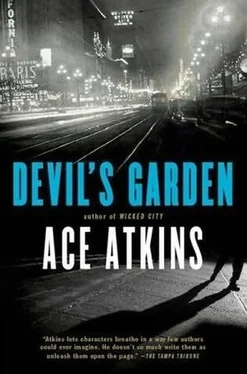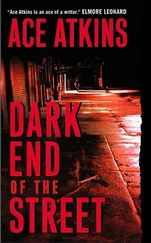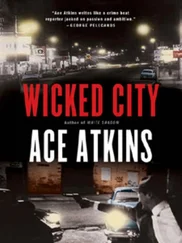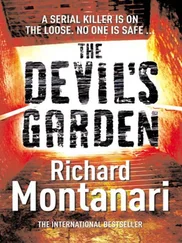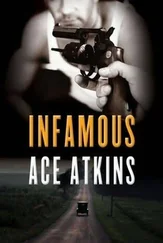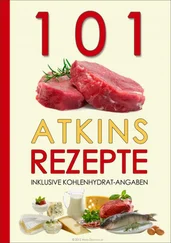It was Alice Blake, her face a mess of paint, a sloppy red smile on her lips.
The other woman, the girl from the Manchu, settled into Fishback’s chest.
“Boom, chisel, chisel,” Sam said. “Boom, chisel.”
The girl said, “Yes, of course.”
Fishback’s face looked as if it were made of parched paper, dark circles under his eyes, a lazy, go-to-hell look. He’d grown a clipped mustache, the rest of his face stubbled and unshaven.
On the top bunk, a Chinese man in traditional silk getup stroked a white cat as he sucked on a pipe.
“Have you ever danced on a table?” Fishback asked, disheveled but still handsome.
Sam didn’t say anything.
“We all danced,” Fishback said, as if the words called for great effort.
“For two days straight. With my beauties.” He kissed them and looked to Sam. “And now I’m no longer afraid of death. I’m so rude. Would you like a smoke?”
“I’ll stick to Scotch.”
“You show ’em.”
Fishback laughed and rocked back into the bed. The girls snuggled into him.
“I just finished a film,” Fishback said. “And I couldn’t stop thinking. My body was exhausted and my mind was still going. Do you have any idea what that’s like?”
“I have something for you,” Sam said, pulling the subpoena from his coat.
“I like to do something I fear,” Fishback said. “I like to set up obstacles and defeat them. I like to be afraid of the project. I always am. When I get into something, really into something, I always believe I shouldn’t have the job. But you know what? I fooled them again. I can’t do it. I don’t know how to do it. The anxiety works for me.”
“You’re wanted in court tomorrow.”
“You can’t save him.”
“Tomorrow,” Sam said, tossing the subpoena into his lap.
Alice Blake picked it from his chest and opened it with thick fingers. She squinted one eye at Sam and made a gun from a thumb and forefinger and just said, “Kennedy,” before leaning over and kissing the Oriental gal and resting her head on Fishback’s chest.
“Doesn’t he look like Wallace Reid?” Fishback asked.
Two days later, Fishback testified. McNab slung arrows. Fishback repeated the same tale from the first trial.
Five days later, a masseuse showed up at his hotel room. She found him naked, cold, and dead on the floor. His body was shipped back to Los Angeles on the same train that had brought Virginia and buried not ten paces from her.
Roscoe stood trial for killing Virginia Rappe three times. The third jury acquitted him after deliberating for five minutes, calling the case an insult to their intelligence and even posing for pictures with him after the whole thing wrapped. They wrote him a letter of apology that all the newspapers ran, except the Hearst papers, Roscoe noted, and by April the movie houses had dusted off their reels of Crazy to Marry and Gasoline Gus. He could now drive down to the airfields and picnic as the zeppelins would take off and land and was welcomed on picture sets with his old buddy Buster, who asked him if he’d like to direct a couple comedies he’d written during all this mess. Minta stayed on with him, Ma taking a room downstairs by the bowling alley, and all through those first days in April he’d join his ex-wife at the piano and they’d remember old songs from when they were teenagers performing at the Byde-A-While, and sometimes Roscoe would accompany her on kazoo, bringing Luke to his feet with a great howl.
It was two days after Easter, not even a week since returning home, that Al Zukor showed up at the West Adams house, refusing to hand over his coat to the butler, saying he didn’t want to interrupt, only to offer the congratulations of everyone at the picture company.
Roscoe offered him a tea, coffee, a cigar perhaps? But Zukor said he really must be going.
“I have some ideas,” Roscoe said. “Some of the pictures we had set, I think I like Thirty Days best. A rich playboy who can only escape his woman’s rival by ducking into prison. I make fun of the situation, that’s the only way.”
Zukor nodded.
“Would you like to hear a song?” Roscoe asked.
“I really must be going.”
“Dine with us, Musso and Frank’s. Like the old days.”
“That’s what I wanted to talk to you about.”
Roscoe looked at him.
“The Hays Commission, Will Hays, has banned you.”
“Banned me?” Roscoe said, laughing. “From what?”
“Making pictures.”
“I was acquitted.”
“There was a deal,” Zukor said, his eyes finding the floor. “You are doing the industry a great service. Be patient, mein Kind. If it wasn’t for the commission, every goddamn picture would be sliced up by every two-bit censor and religious nut.”
“I’ve lost a chunk of change during this mess,” Roscoe said. “They say they could take my home.”
“You’ll be back,” Zukor said. “I just wanted you to hear from me and not those goddamn newspapermen. They should be knocking on your door anytime. I suggest you get out while you can. Ask for a private table. They’ll understand.”
Roscoe felt a palsy in his cheeks. Minta rose from the piano. Roscoe held the edge of the piano. Luke sniffed at Zukor’s leg and began a low growl.
“How can they do this?”
“We voted,” Zukor said. “All of us did. It was best with the trial and all, and a few other things. The average Joe thinks Hollywood is the devil’s garden. See? We have to show them different. Listen, I tried my best to stop Hays, but he was intent that you were taught a lesson.”
“I was acquitted.”
“He said it sends the wrong message, that we can’t be tough enough on our own people. We must show toughness now.” Zukor shrugged. “In a year? Maybe another story.”
Roscoe just stared at him, feeling his heart drop, wanting a drink very badly.
“Maybe we can get a deal for Luke,” Zukor said. “How’d you like that?” Luke continued to growl, Minta walking by Roscoe and grabbing the dog’s collar. Teeth now bared.
Zukor had a fine camel coat laid across his arm and a beaver hat in his fingers that he nearly dropped while trying to shake Roscoe’s hand again. Roscoe took his hand but didn’t hold it. Zukor patted his shoulder and called him his child again, and just walked away, up the little landing and across the great hallway of marble checkerboard.
Roscoe did not move.
“Why has God done this to me?”
Minta didn’t answer, only sat back at the piano and started to play a song that they sang together in all those saloons and mining towns, and he turned to her, resting his hand upon her shoulder, and joined in, taking the time for a solo on the old kazoo.
He sang louder and louder, the windows of the mansion shaking, one song breaking into the next, while the front door chimed and the telephone rang. Minta’s gentle voice warming his heart until tears ran down his face and hit the keys.
He would not star in another picture for a dozen years, the very same year he died.
IT WAS FALL OF 1924 and Hearst decided on a party, quickly settling on the theme, the birthday of his good friend Tom Ince. He cobbled together a group of thirteen, including Miss Davies, and they all sailed from Wilmington on his sturdy little Oneida. That first night there was a spectacular dinner party, lobster cocktails and roast turkey and the endless uncorking of champagne for his guests. At sunset, the crew strung red Japanese lanterns along the rigging and the whole yacht took on a mystical glow in the balmy night, the thirteen gathering on deck for song and dessert, coffee, and more champagne. A giant birthday cake was brought out for Ince, baked in the shape of a horse since the man was famous for directing all those westerns-or what Hearst loved to call “horse operas.”
Читать дальше
